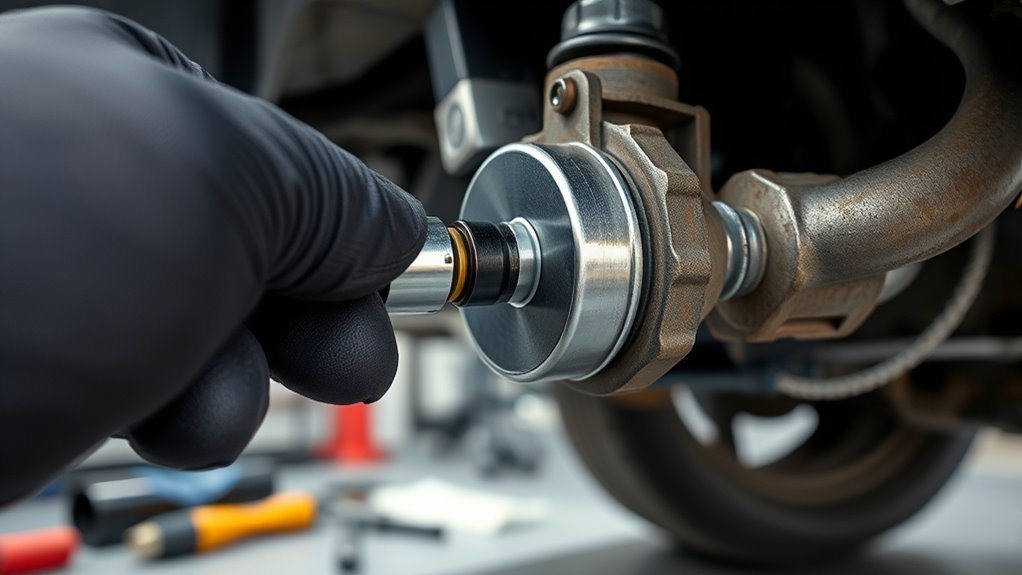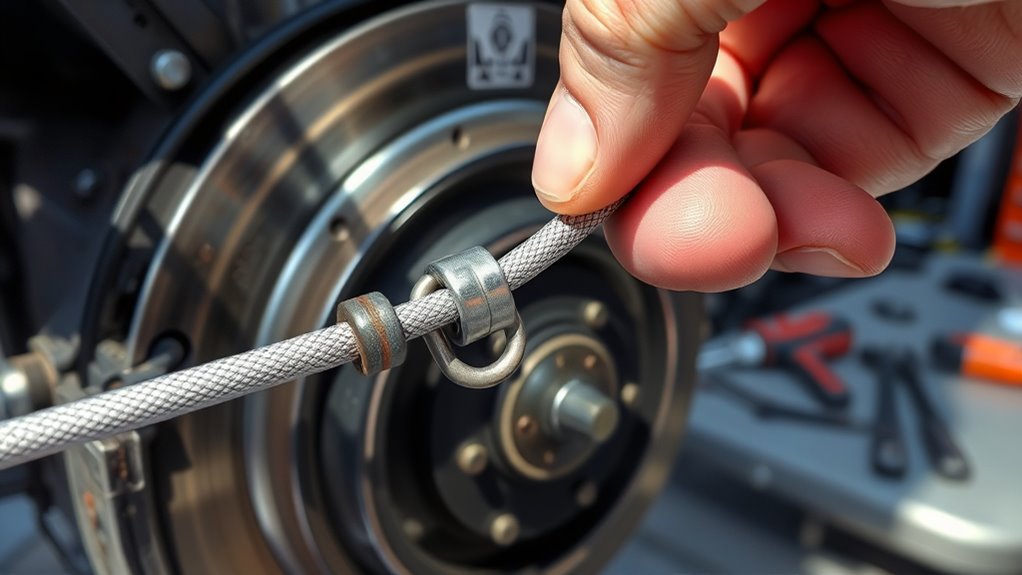To maintain your parking brake, regularly inspect the cable for fraying, rust, or damage. Keep the cable lubricated with a light, suitable spray to guarantee smooth operation and prevent corrosion, which can cause stiffness and responsiveness issues. Adjust the tension as needed to keep the brake engaging properly without excessive force. If you notice severe corrosion or damage, replace the cable promptly. Keeping up with these tips can help your parking brake stay reliable and perform well for longer.
Key Takeaways
- Regularly inspect parking brake cables for fraying, corrosion, or damage to ensure proper function and safety.
- Lubricate cables with a suitable light spray lubricant to maintain flexibility and prevent rust buildup.
- Adjust cable tension periodically to ensure effective parking brake engagement and prevent excessive wear.
- Replace severely corroded or broken cables promptly to avoid safety hazards and system failure.
- Have a professional inspect and service the parking brake system for accurate adjustment and reliable operation.

Caring for your parking brake cable is essential to maintaining proper adjustment and function. Over time, dirt, rust, and corrosion can accumulate on the cable, making it stiff and less responsive. Regularly inspect the cable for fraying, corrosion, or damage, especially if you notice a decrease in braking performance. Lubricating the cable with a suitable lubricant can keep it flexible and prevent rust. When lubricating, avoid using thick grease that can trap dirt; instead, opt for a light spray lubricant designed for cables. Additionally, understanding the role of cable tension in brake performance can help you better assess when adjustments are needed. If the cable is severely corroded or broken, replacing it promptly is vital to avoid safety issues. Keeping the cable clean and well-lubricated also extends its lifespan and prevents the need for frequent adjustments. Remember, the cable’s condition directly affects how well your parking brake works, so don’t overlook this maintenance step. If you find yourself needing to adjust the brake frequently, or if the cable feels stiff or unresponsive even after lubrication, it’s a good idea to have a professional inspect the system. Proper adjustment and care of the parking brake cable ensure your vehicle remains safely parked, prevents unnecessary wear on other brake components, and keeps your parking brake functioning reliably for years to come.
Frequently Asked Questions
How Often Should I Check My Parking Brake Cable Tension?
You should check your parking brake cable tension at least once a year or whenever you notice it doesn’t hold the vehicle securely. Regular inspections help identify signs of wear or stretching early.
If you feel the brake pedal or lever needs more travel to engage fully, it’s time to verify the tension. Maintaining proper tension ensures your parking brake works effectively, keeping you safe and preventing costly repairs down the line.
Can a Faulty Parking Brake Affect Transmission Performance?
A faulty parking brake can indeed affect your transmission performance. Imagine a tightrope walker struggling with a loose rope—that’s your transmission under strain from a malfunctioning parking brake.
When the parking brake doesn’t release properly, it puts extra stress on the transmission, potentially causing slipping or damage over time.
Regularly checking and maintaining your parking brake guarantees smooth operation, preventing these issues and protecting your vehicle’s transmission health.
What Are Signs of a Worn Parking Brake Cable?
You’ll notice a worn parking brake cable if your brake doesn’t hold the vehicle securely when engaged, or if you hear squeaking or grinding sounds when applying it.
You might also feel a loose or spongy pedal, or see the parking brake light stay on even when it’s released.
Additionally, uneven or delayed engagement signals the cable may be stretched or frayed, requiring inspection or replacement to guarantee safety.
Is It Necessary to Replace Both Cables Simultaneously?
Imagine you’re in a vintage drive-in movie, and yes, it’s vital to replace both cables simultaneously. When one cable shows signs of wear or corrosion, the other is likely near the same point of failure due to similar age and usage.
Replacing both ensures even tension, reliable braking, and prevents uneven wear that could compromise safety. It’s a smart move to keep your parking brake functioning smoothly.
How Do Environmental Conditions Impact Cable Longevity?
Environmental conditions markedly impact cable longevity. Exposure to moisture, salt, and dirt accelerates corrosion and rust, weakening the cables over time.
Extreme temperatures cause materials to expand and contract, leading to wear and potential cracking.
If you live in a harsh climate, regularly inspect and clean your cables, and apply protective lubricants. Taking these steps helps prevent premature failure, ensuring your parking brake remains reliable longer despite tough environmental factors.
Conclusion
Remember, just like tuning a musical instrument ensures perfect sound, proper parking brake adjustment keeps your vehicle humming smoothly. I once forgot to check my brake cable, and it almost cost me a tow; since then, I make it a habit. Regular maintenance is your safety net—small tweaks now prevent bigger issues later. Think of your parking brake as the anchor that keeps your car steady—keeping it in tune means peace of mind on every stop.









